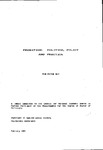PROBATION: POLITICS, POLICY AND PRACTICE
| dc.contributor.author | MAY, TIM PETER | |
| dc.contributor.other | Faculty of Arts, Humanities and Business | en_US |
| dc.date.accessioned | 2013-11-20T14:22:19Z | |
| dc.date.available | 2013-11-20T14:22:19Z | |
| dc.date.issued | 1990 | |
| dc.identifier | NOT AVAILABLE | en_US |
| dc.identifier.uri | http://hdl.handle.net/10026.1/2785 | |
| dc.description.abstract |
The aim of this study is to understand changes in the criminal justice system and their effects on policy and practice within the probation service In England and Wales. Towards this aim it utilises the techniques of participant observation, interviews, documentary research and an extensive self-completion questionnaire. The study proceeds by examining the history and politics of the Service and the relationship of these to changes in internal policy and occupational practice. More specifically, it then considers the responses of one probation area. Therefore, the study does not separate the issue of environmental effects on an organisation and how that has consequences for policy and practice within the Service. Within the Treen policy process, an 'implementation gap' is found to exist between probation management (ACPO and above) and the front-line (probation officers and ancillaries). However, the study goes further by examining the issues of autonomy and accountability of probation staff in relation to the organisation itself , as well as other groups and agencies. Further, alterations in the roles of personnel are examined in relation to the changes which policy implies. Again, significant differences are found to exist between the two groups of staff mentioned above. In order to further understand these differences, the study then examines ‘everyday work’ and finds that discretion is a necessary feature for managing and controlling a probation work setting . In the process, the issue of the compatability of policy and practice is raised and found to be wanting. Utilising a model developed in chapter 2, the study then seeks to understand these tensions as stemming from the 'politics' of the ‘alternatives to custody industry’ with its emphasis on central control and punishment; a philosophy at odds with the Service's traditional humanitarian concerns. The study finds in the nature of policy, a need for both both uniformity and predictability in probation work. However, the working environment is found to be neither uniform nor predictable, with front-line personnel also firmly believing that they need discretion in order to exercise their duties effectively. Finally, from a further understanding of this 'politics of probation', the study finishes with beliefs on the future development of the Service. | en_US |
| dc.language.iso | en | en_US |
| dc.publisher | University of Plymouth | en_US |
| dc.title | PROBATION: POLITICS, POLICY AND PRACTICE | en_US |
| dc.type | Thesis | |
| plymouth.version | Full version | en_US |
| dc.identifier.doi | http://dx.doi.org/10.24382/4177 |
Files in this item
This item appears in the following Collection(s)
-
01 Research Theses Main Collection
Research Theses Main


